Spark of Goodness
A little over six months ago I wrote that Gavin Hood’s Tsotsi had become “the big stand-out at the end of the Toronto Film Festival.”
A few weeks later Tsotsi was picked up by Miramax and is playing in theatres starting today (2.24). And it seems safe to say now that it’s the most likely winner of the Best Foreign Language Oscar on March 5th…unless a sufficient number of Academy members take leave of their senses and vote for Joyeux Noel.
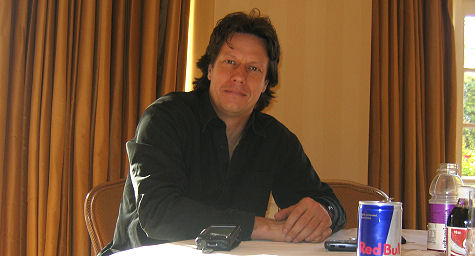
Gavin Hood, director of Tsotsi (Miramax, 2.24), at the Four Seasons hotel — Tuesday, 2.21, 4:20 pm.
Based on a book by South African playwright Athol Fugard and set in a funky Johannesburg shantytown, Tsotsi (pronounced “Sawt-see”) is about a merciless teenage thug (Presley Chweneyagae) who discovers a small spring of compassion in himself when he starts to care for an infant boy he discovers in the back seat of a car he’s stolen.
Tsotsi‘s basic achievement is that it sells the notion in a believably non-sappy way that sparks of kindness exist in even the worst of us.
< ?php include ('/home/hollyw9/public_html/wired'); ?>
I knew Tsotsi would probably connect with general audiences when it won the Toronto Film Festival People’s Choice award, which followed a similar win at the Edinburgh Film Festival a month or two earlier.
But I wasn’t certain until my good Toronto friend Leora Conway saw Tsotsi at a Toronto Film festival screening and “was beaming when she told me about it afterwards,” I wrote, “and said it made her cry at the end.”
Tsotsi may sound sentimental and manipulative, but it’s not. But neither is it sadistic or repellent in some flashy, gun-fetish way. It has a raw authenticity, but not in any kind of derivative City of God way, which speaks well for its director, Gavin Hood.
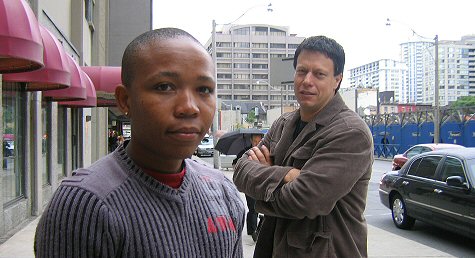
Tsotsi star Presley Chweneyagae (l.) and Hood outside Toronto’s Sutton Place hotel — Friday, 9.16.05, 8:55 am.
Tsotsi proves that suppressed emotions…the feelings that a blocked-up person would rather not feel but which won’t leave him alone…are always a stronger, more poignant proposition than a film delaing with feelings fully expressed.
Hood told me in Toronto that he’s always been “terrified” of sentimentality and “being mushy” in movies, and says that his mantra during shooting was that “there’s always got to be more going on within a character than what he lets out.”
He said he wanted to use formal compositions and a slower editing style than the one popularized by City of God “because I didn’t want to seem like I was saying ‘me too’…I didn’t want to come in second.”
Hood says he feels more of an affinity with the shooting style of director Walter Salles (The Motorcycle Diaries) and particularly Sales’ Central Station.
I had another sit-down with Hood two days ago (Tuesday, 2.21) at the Four Seasons hotel in Beverly Hills. Here’s a recording of most of it.
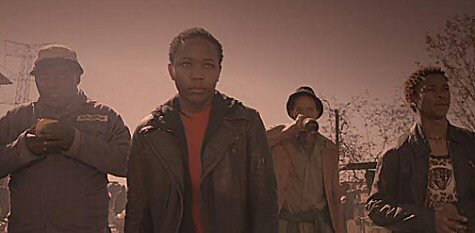
The Tsotsi gang
Tsotsi is one of those “it” films. You can feel the focus and the unique energy from the get-go…from Hood’s precise and well-organized direction and the elegant pho- tography to Chweneyagae’s mesmerizing performance as an ice-cold psychopath who now and then devolves into a terrified three-year-old.
It all comes together into something steady and profound. Which is why Hood will almost certainly be handed the prize on 3.5.
Sequel
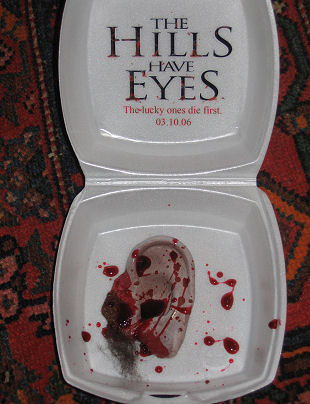
Promotional item delivered to my home today (Friday, 2.24), sent by friends at Fox publicity
Non-Fan Lets Go
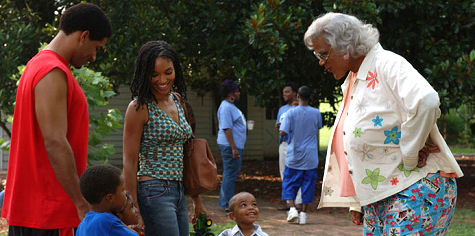
“I think some of these people are nothing more than knee-jerk reactionaries who use the Church as a cudgel or a weapon, and disguising it as ‘values.’ Perry is doing nothing more than cooning. shuckin’ and jivin’ for a slightly more conservative audience is still shuckin’ and jivin’. I’m pissed. I’m pissed that both of his movies were made, and I’m equally pissed that there was an audience for them.
“African-Americans are going to be split on this. More educated, more affluent African-Americans — like me, my friends and my family — are going to stay away in droves, for the most part. The more working-class, less educated segments of the African-American community will be a different story.
“As much as I despise Tyler Perry, he is not the problem here. He’s just a symp- tom. He’s like every fake preacher I’ve ever seen work over a crowd. He times his message to foster group-think agreement from his audience, getting his audience good and mad over whatever flavor of the month issue ‘they’ are doing to hurt decent people like them, the ’cause’ or the community.
“And then, with emotions whipped up, he or she asks for money, because he or she’s got an idea that will fix everything. Tyler Perry is obviously asking for his money up front, but more power to him.
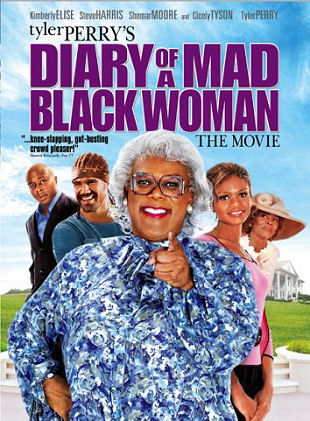
“It’s Hollywood that I have a real problem with. I hate to say it, but I see racism in the decision to promote this fool. Hollywood is supposed to be a business with its only eye on the bottom line, yet it willfully and consistently ignores a segment of the audience.
“Why? It’s not like there’s no money to be made. Yet is it only the material that shows the worst of African-American culture that gets served first. What about the rest of us? We get plenty of comedies (on TV and in the Movies) with African- American casts. We still get John Singleton’s (to me, equally offensive) gangsta/pimp movies from time to time. But the serious dramas, with African- American casts and directors, like Antwone Fisher, come few and far between. Why?
“Denzel, an established movie star with two Academy Awards in his pocket and bankability on his side, had to wait ten years to make Antwone Fisher. This guy Perry comes along and they’re throwing money at. If that’s not racism…” — Malcolm Johnson, Burbank, CA.
Brilliant
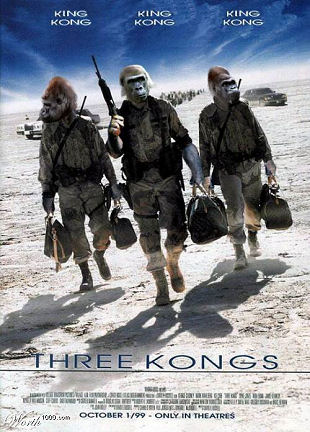
Here She Comes!
It’s a little beside-the-point for a mildly snobby existentialist white-guy journalist like myself to put down Madea’s Family Reunion (Lionsgate, 2.24), Tyler Perry’s God-praising, conservative-values sequel to Diary of a Mad Black Woman.
It’s a fairly crude and clumsy film, but I don’t think this matters. Because on its own terms and with the right crowd, Family Reunion works. I felt it last night at a big splashy premiere screening at Hollywood’s Arclight theatre, and I didn’t say a single snide or contrary word to anyone at the after-party. That would have been impolite. And again, guys like me are so not the point.
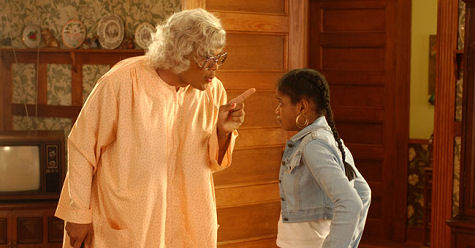
Tyler Perry as Grandma Mabel “Madea” Simmons (l.) and excellent young actress (met her at after-party, can’t recall her name) in Madea’s Family Reunion (Lionsgate, 2.24)
Perry is a very popular brand-name entertainer and admired playwright among black audiences, Mad Black Woman made $50 million last year and Reunion , which is said to be tracking better and is opening in more theatres than its predecessor, is expected to earn at least $20 million this weekend (if not more).
Madea’s Family Reunion is a Christian-values family drama mixed with raunchy humor and by-the-numbers plotting and character building that are truly groan- worthy if you watch it with the wrong attitude.
Lionsgate has signed a deal with Perry to release a whole series of Madea films over the coming years. I mean, as long as they continue to be profitable.
Screw subtlety and finesse, Perry and this movie seem to be saying. We’re about right-thinking traditionalist values (flying straight, respecting family elders, not tolerating bad behavior or people who don’t get it), and at the same time giving our African-American target audience a good time.
Set in Atlanta and dealing with a large family who are all related to Perry’s Madea character, Reunion was performed as a play for about a year and a half before shooting late last summer. (The play version is viewable on DVD.) I’m imagining that the stilted, preachy dialogue feels like a better fit in a theatrical setting than it does in this film.
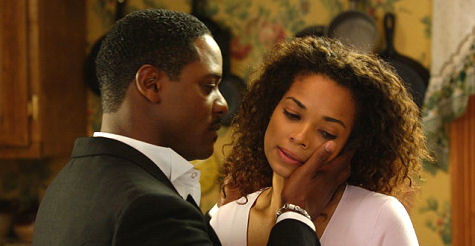
Blair Underwood, Rochelle Aytes
Madea’s Family Reunion isn’t a comedy but a serious-problem drama with laughs. It’s nominally (and very tediously) about family dysfunction and emotional wounds being passed along from generation to generation — themes that were dramatized with a lot more skill and finesse in Denzel Washington’s Antwone Fisher.
The saving grace is Perry’s performance as a tough-talkin’, occasionally ass- whoopin’ 68 year-old butch boss named Grandma Mabel “Madea” Simmons. Wearing a white wig, a housecoat and a pair of prosthetic boobs that look like swinging cantaloupes, Perry is hilarious as a proverbial Big Momma who sets things straight ’cause she’s good with God and knows what’s right and won’t take any noise.
This is a very Old Testament-type package, and I suppose there’s nothing terribly wrong with this. Life is chaotic without ethical discipline of some kind. Woe to the moral relativists!
It should be noted that Madea’s Family Reunion isn’t entirely anti-violence. It says beatings are horrific when it comes to husbands overpowering their wives (obviously) but righteous when you’re Madea and you need to straighten out some high-school kid. A lot of people get whupped and stomped on or at least yelled at when they defy Madea, or say or do something selfish or foolish, like not going to school or “smackin’ that chewin’ gum” or giving a young girl grief on a school bus.
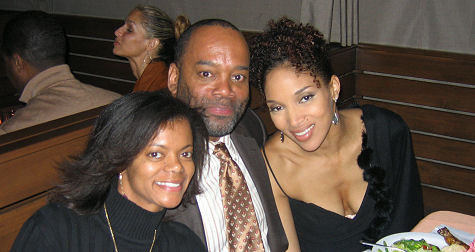
Actress Fabiola Cayemitte, unknown friend of Madea costar Lisa Arrindell Anderson, and Anderson herself at post-premiere party — Tuesday, 2.21, 10:40 pm.
The mostly African-American industry crowd at Tuesday night’s screening was laughing in all the right places, and occasionally cheering Madea’s moral-ethical points with applause.
The plot is a homespun thing in which Madea helps some of her family get in touch with self-respect and moral backbone during a family reunion (the circumstances of which aren’t very well explained). The problems include domestic violence, money lust, incest, fear of intimacy and relentless farting on the part of Uncle Joe (also played by Perry).
The bulk of the film involves the emotional wreckage caused by abusive mom named Victoria (Lynn Whitfield), who’s managed to screw things up for her two daughters, Lisa (Rochelle Aytes) and Vanessa (Lisa Arrindell Anderson).
Lisa is engaged to Carlos (Blair Underwood), a moustachioed big-dick banker who beats her because she won’t mind and especially when she threatens to leave him. Vanessa is afraid of getting into an intimate relationship with any man even though a very good looking, almost too-good-to-be-true bus driver named Brian (Boris Kadjoe) is after her for a date.
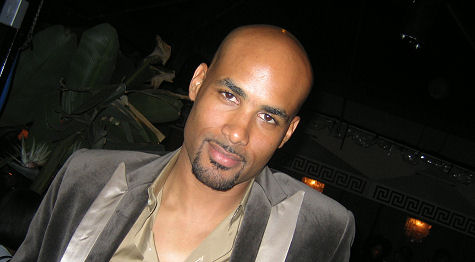
Madea’s Family Reunion costar Boris Kodjoe at after-party following screening at Arclight Dome — Tuesday, 2,21, 10:25 pm.
The very good-looking Kadjoe is the most appealing actor in the film, and I’m now sorry I never caught The Gospel, which he starred in, when it played last October.
There’s a big family-values speech given by an elderly aunt character played by Cicely Tyson at the end of the second act that has to be seen to be believed. She speaks to the whole clan (including several young kids) about holding on to the good eternal things in life, etc. They all listen to her and nod and take it in, and then they hug each other when she tells them to. “Lacking a sense of reality” barely scratches the surface.
But this is nothing compared to a bizarrely designed wedding scene near the finale. The designer-within-the-film is a middle-aged woman who’s a bit full of herself, and she’s come up with an idea meant to suggest the aura of Paris, France. The two biggest elements are (a) a gold-painted Eiffel Tower and (b) young girls dressed in angel-like gowns and suspended from the ceiling by wires and pretending to strum harps. They look like they’ve been drugged. It’s like a scene from a Fellini or a Luis Bunuel film from the late ’60s or early ’70s, but without the wit.
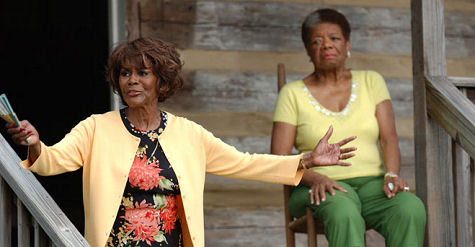
Cicely Tyson (l.) during the family-clan speech scene, which she delivers outdoors without a microphone but is heard clearly by dozens, some of whom are standing a ways off. Costar, poet, historian and best-selling author Maya Angelou sits to the right.
Perry has been called a “retro-futurist with a natural knack for making audiences laugh.” When he’s onscreen playing Madea or Uncle Joe, he rules. He’s given himself all the funniest and wisest lines, and basically comes off as a suffer- no-fools and take-no-guff Groucho Marx.
Again, I have no disagreement with what’s being said in this film. The spirit of it is agreeably wholesome. The problem is that Perry is a barely competent filmmaker and a third-rate screenwriter. He needs to work with someone who can refine his material and make his films play better with people like me.
I would love to get with the Perry program and not be one of those pissy-fussy types, but I just can’t do it…sorry. Espousing good values ain’t enough. It’s the singer, not the song.
I’d love to hear some reactions if anyone goes on Friday or Saturday. However it hits you, don’t hold back.
Blue
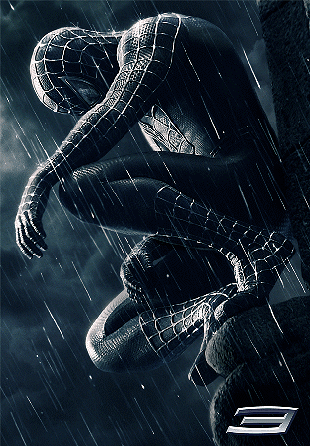
Blast Off
Urban crime movies stopped touching the pavement a long time ago. They’re all about art-gallery aesthetics — color, flash, attitude, style — assembled for under-30 action geeks and comic-book fans who’ve been totally indoctrinated to the notion of urban shoot-em-ups as blood operas. Heightened, accelerated…John Woo on steroids.
The trick is not to fight it. Once you’ve totally given up on the idea of ’70s-style realism penetrating anything ever again, you’re free. That’s been my attitude since the Tarantino and Woo waves of the mid ’90s. No one’s ever going to make another Laughing Policeman or Get Carter or Bullitt, and the most we can hope for from this totally corrupted genre is energy, originality and, as far as it goes, hard work.
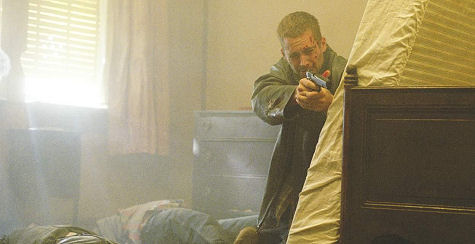
Paul Walker in Wayne Kramer’s Running Scared (New Line, 2.24)
Realism is out the window…a nostalgia trip…but comic-book smarts and directorial discipline are still possible. And this is what you get with Wayne Kramer’s Running Scared (New Line, 2.24).
This is a totally insane action film that’s very precisely parcelled, a gunshot-wound drama in which the pressure gets more and more intense and everything goes all to hell…but imaginatively.
At times it feels cohesively insane in the manner of Terry Gilliam and more and more Heironymous Bosch-like as it goes along. Running Scared is a car we’ve all driven around in before (the post-1995 genre rules demand what they demand) but souped-up and very finely tuned, thanks to a skilled mechanic.
The opening and closing credits alone (the latter, especially, is art gallery stuff supreme) are worth the ride.
Joey (Paul Walker), some kind of blond-haired, blue-eyed tough guy with a wife (Vera Farmiga) and a kid, gets himself into trouble over a shiny handgun — the MacGuffin of the piece. It’s been used by one of his criminal pals to blow away a corrupt cop (which happens as part of a horrific shootout), and Joey has been told to get rid of it.
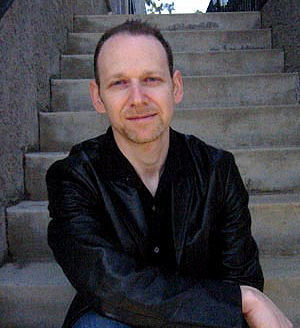
Director-writer Wayne Kramer
He hides it in his cellar instead (asshole!), and it’s quickly stolen by a friend of his young son who lives next door, and then used to shoot (but not kill) the kid’s psychotic Russian asshole father. The kid runs off and the whole film is about Joey trying to find the kid, get the gun and toss it before his no-good pals find out he’s a screw-up and has put them at great risk. And we all know what that means.
I’m just going to run an e-mailed conversation I had with Kramer two or three weeks ago, right after I first saw the film.
Me: You’re a very talented guy, Wayne. Your movie is insane but very crafty. It was thrilling and all that, but I was laughing now and then too. Excellent chops all the way through (loved that bit with Walker picking up the .38 slug with the gum sticking to the sole of the boot), but my God…the cruelty, the bruisings, the rage. And the lousy luck!
Kramer: I’m a big fan of the hard-assed genre of filmmaking, and I wanted to make something that would entertain and shock at the same time. I remember having those experiences with films like Get Carter, The Long Good Friday, Scarface, Death Wish, Prime Cut, etc. But I also wanted to bring something a little more subversive to the table.
Me: When I think of the gentle rhyme and affection and poetic symmetry in the finale of [Kramer’s last film] The Cooler and then this….I said to myself ‘excellent chops and a helluva ride but…well, you know, Wayne got that out of his system!’
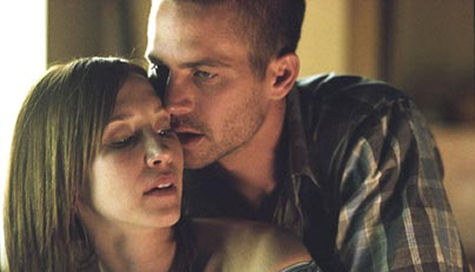
Kramer: Running Scared is definitely not The Cooler, and fans of that film will probably be quite taken aback. Running is is its own beast — an extremely hysterical film and very hallucinatory. Especially given that it inhabits a subtle Grimm’s fairy tale universe.
I’m glad you picked up on the Gilliam-esque quality to some of the scenes. And good call on the Bosch touches. But either audiences are up for the ride or not. It’s not the kind of work that’s going to change the world, but I think it will certainly entertain fans of the genre.
Me: Plus you’ve put yourself on the map with this film as a very high-octane hardball style guy. Anyone seeing this would have to respect the discipline that went into the story, the McGuffin of the snub-nosed .38. It’s a very tight thing all through.
Kramer: It’s not the kind of work that’s going to change the world, but I think it will certainly entertain fans of the genre. Most people need a stiff drink afterwards, I’m finding out.
I don’t know — I’m just sick to death of all the P.C. PG-13 crap out there. I wanted to remind audiences of the kinds of films that used to be made. This could never have been developed and produced with a big studo. It’s a minor miracle that a mainstream mini-studio like New Line is even releasing it. But they’re supporting it.
[Kramer and I spoke of a violent stand-out sequence involving Vera Farmiga and a middle-aged couple she runs into halfway into the film, plus a surprise revelation plus issues about the ending. Too many spoilers.]
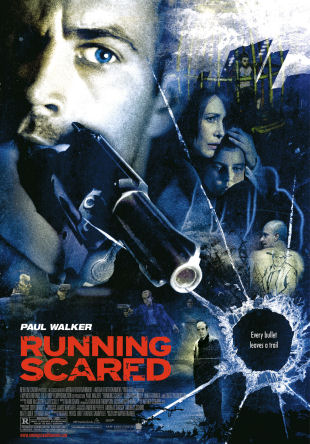
Me: I loved the ice-hockey torture and shoot-out finale. The black lighting was pleasing and I have to say I laughed out loud when everybody started eating bullets.
Kramer: I guess I wanted to do something different with that. I haven’t seen the black-light effect done before and a lot of these amateur rinks are painting the ice and holding games under black light, or parts of the game.
I was also going for a bit of a spaghetti western vibe. You see the same old venues for gunfights in so many movies (like the deserted factory or warehouse, etc.), I just thought it would be cool to have an interrogation scene on a ultra-violet ice rink, and then to have exploding UV ice chips once the carnage started. It was enormously challenging to pull that scene off, especially on a fifteen million dollar budget. I think it cost about a hundred grand just to light.
Me: Anyway, an amazing film. Amazing control and discipline. Very well executed…and who’s the genius who did the end-credits sequence?
Kramer: I’m glad you appreciated the end credits. It was a fight to get the company to pay for them — the theory being that nobody stays to watch end credits anymore. PIC (Partners in Crime) did the work based on a concept I came up with. They’ve also worked on Van Helsing, Serenity and The Punisher.
Grabs
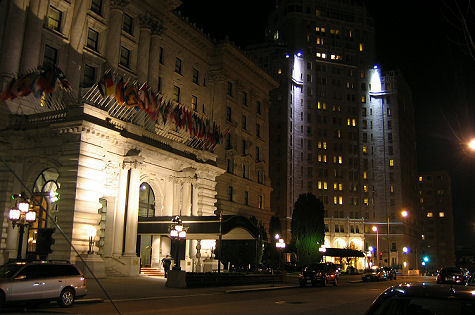
San Francisco’s over-photographed, totally-touristy Fairmount Hotel — Monday, 2.20, 9:45 pm

Coming into Oakland airport — Sunday, 2.19, 12:10 pm
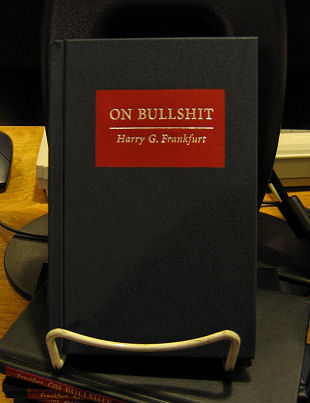
Book sitting on checkout counter at City Lights bookstore —
Monday, 2.20, 8:35 pm
Sadness Seeps Out
With Oscar buzz sputtering and the new films barely worth a tumble (and I’m including Carlos Reygadas’ Battle in Heaven, which the Village Voice‘s Michael Atkinson is over the moon about but for me is utterly lacking a pulse), the coming weekend looks like a perfect stay-at-homer and a maybe a chance, if you’re so inclined, for a long nourishing sit in front of the tube.
Except it doesn’t feel long. Sit back and watch the recently re-released PBS Home Video DVD of David Grubin‘s LBJ, a 235-minute documentary about the triumphs and tragedy of Lyndon B. Johnson, and I swear to Christ it will lead you into a comfort zone that will hold you and make those four hours seem like 40 minutes.

Lyndon Baines Johnson, 36th president of the United States
You won’t just be glad you settled in with something this wise and grounded — it’ll put you in touch with what it is to strive and build and tap into a great inspiration, and then take a wrong turn for whatever reason and watch it all crumble and go to hell.
I’ve seen LBJ three times now, and there’s no question of it being one of the greatest American history docs ever made. If you’re boomer-aged it’s a haunting memory trip about the ’60s, and if you’re GenX or younger it’s an education that will give you the whole thing like nothing else ever has.
(For readers who don’t know zip about Johnson, here’s the Wikipedia biography.)
Widely praised by every credible TV critic in the country, LBJ was first seen on PBS in 1991 as part of the “American Experience” series. It was out on laser disc in ’97 or thereabouts, and it was available on DVD in an earlier package. I frankly don’t know why PBS Home Video has re-released it, but I’m glad they did because it gives guys like me a chance to riff anew.
Forget the documentary label — this is one of the greatest filmed epics ever made. I’m not exaggerating. It’s as good as Ken Burns The Civil War or anything like it that summed up a life or a culture or a common struggle, and made it fully under- standable from all angles.
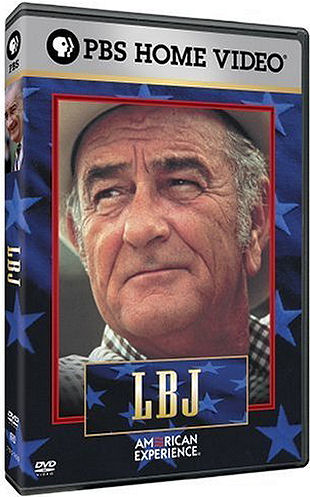
LBJ gets me partly because my grandfather on my father’s side was a lot of like Lyndon Johnson — tall, Southern (from Kentucky), big of heart and a bit coarse. But the fundamental greatness of Grubin’s doc is that it reshapes a much-maligned politician’s life into the stuff of Greek tragedy.
I used to seriously despise Johnson — everyone I knew from any kind of liberal education over the age of 10 felt the same way in the mid to late ’60s — but Grubin’s doc turned me around. Now I think of LBJ’s life as one of the saddest stories ever told.
LBJ isn’t just about the rise and swift downfall of a flawed and complex and contradictory man of power. It’s about one of the most melodramatic ruinings of a once-brilliant political career in U.S. history…about how a man who finally found a great use for his gifts as a master politician and wheeler dealer by pushing through the greatest surge of social welfare programs since the New Deal, and then saw it all collapse like walls of Jericho.
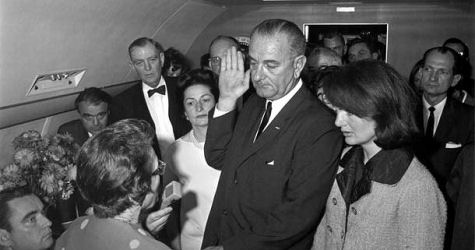
The staggering ignorance on the part of Johnson and his cabinet in their handling of the Vietnam War led not just to awful devastation and the deaths of 58,000 U.S. servicemen (and hundreds of thousands of Vietnamese and Cambodian victims), but also to the destruction of Johnson’s Great Society and the undoing of aggres- sive social-welfare attitudes in the government that led to the rise of Nixon, Reagan and the Bushies.
Consider all this and it’s still fairly easy to think of Johnson as a very bad guy. But the watching of LBJ adds commonality and contour to the legend. It reminds you time and again that we’re all composed of contradictions and inspirations, and God help the man or woman who lets the wrong stuff guide because tragedy beckons at every turn.
Here are some of the things said by some of the Johnson confidantes interviewed in the first chapter (there are four altogether), and a final word from historian Ronnie Dugger.
“He had been scorned as an unscrupulous poltician…a vulgar wheeler-dealer driven by ambition and a lust for power,” McCullough begins. “But on January 20th, 1965, the night of his inaugural gala, Lyndon Johnson was a happy man. Overwhelmingly elected, he promised to wipe out poverty and segregation, and to protect the old and educate the young. That was his dream.
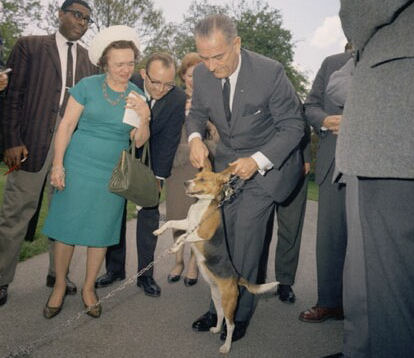
“Few presidents have ever known more triumph, or suffered such a swift and tragic fall.”
John Connally, Johnson’s longtime friend and adviser who later became a Texas governor (and who was sitting in front of JFK in the limo on 11.22.63), says that Johnson “was generous and he was selfish. He was kind, and at other times he was cruel. At times he was an earthy, crude-acting fella. At other times he could be incredibly charming. He could be whatever he wanted to be. He was a strange complex man who basically had almost a Jekyl and Hyde existence. He was two different people.”
“What was it that would send him into those fantastic rages?,” asks Johnson’s onetime press secretary George Reedy, “where he could be one the nastiest, most sadistic and insufferable S.O.B’s that ever lived, and then a few minutes later be a big, magnificent, inspiring leader?”
Historian Robert Dallek says, “What you have is a man who was a thoroughly American president. He was American from day one of his birth in south central Texas. This was a man who reflected American moods and attitudes and contradictions and trends, and when he failed it was America’s failure.”
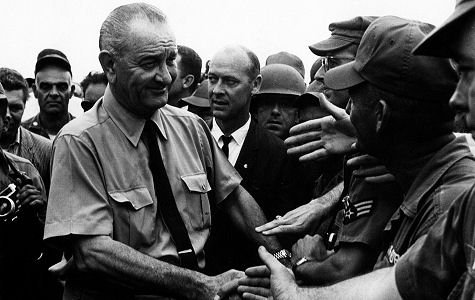
And then Reedy returns, saying that “whom the Gods would destroy they first make mad. This was a man who was so big and reached so far and made it, and then let the whole thing crumble. I think it’s one of the great stories of history.”
And then at the very end is Dugger, a Texas historian and journalist:
“He was just interesting as hell. Compared to most people who kinda go through life making their dreadful moral points or condemning this or hoping for that or scratching the back of their head….Lyndon really moved. He was moving all the time.
“The few times I was with him he was just fun to be around. And you liked him, you liked him. I liked him when I was with him…more than I did than when I was thinking about him.” The laugh that comes out of Duggan after he says this has ironies and echoes in the realm of William Shakespeare.
The Associated Press’s TV critic called LBJ “a brilliant biography of a tragic hero …it is more than history. It is a fascinating story of a life as rich and colorful as fiction…LBJ is a gorgeous piece of cinema.”
Grabs
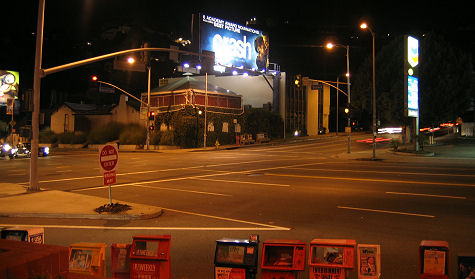
Corner of Sunset Boulevard and Crescent Heights, looking northwest — Wednesday, 2.15.06, 10:40 pm.
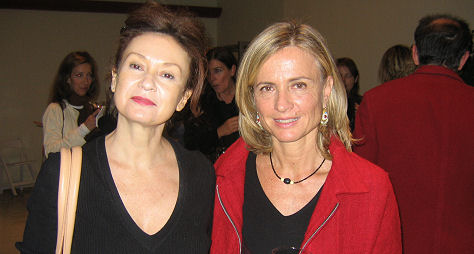
Cristina Comencini (r.), director of Lionsgate’s Don’t Tell (3.17) and manager-producer Victoria Wisdom (r.) at post-screening reception for Comencini and the film at Ferrari dealership on Wilshire Bouevard — Thursday, 2.16.06, 10:05 pm.

Sunset near Doheny — Wednesday, 2.15.06, 1:40 pm.
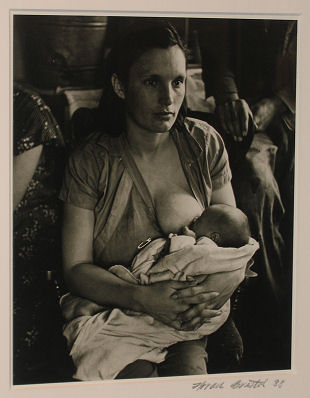
Horace Bristol photograph at Media Rare gallery
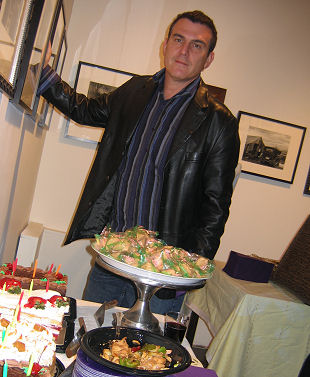
Producer Michael Besman (About Schmidt, The Opposite of Sex) at party at Laurie Frank’s Media Rare gallery at Bergamot Station in Santa Monica — Thursday, 2.16.06, 7:50 pm.
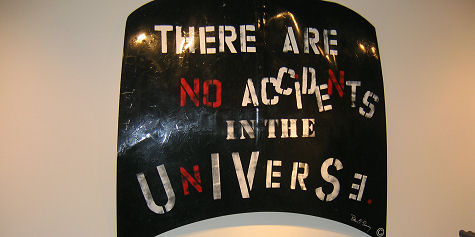
Wall sculpture at Laurie Frank’s Media Rare gallery — Thursday, 2.16.06, 8:02 pm.
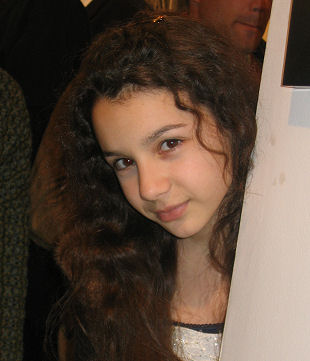
12 year-old actress Hannah Marks (Danika, Acccepted) at Media Rare gallery — Thursday, 2.16.06, 8:10 pm.












